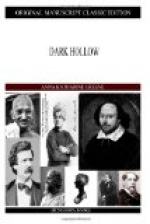She recognised her folly before reaching the adjoining field. But she went on. Where the fence turned, she turned, there being no obstruction to her doing so. This brought her into a wilderness of tangled grasses where free stepping was difficult. As she groped her way along, she had ample opportunity to hear again the intermittent sounds of the hammer, and to note that they reached their maximum at a point where the ell of the judge’s study approached the fences.
Rat-tat-tat; rat-tat-tat. She hated the sound even while she whispered to herself:
“It is just some household matter he is at work upon;—rehanging pictures or putting up shelves. It can be nothing else.”
Yet on laying her ear to the fence, she felt her sinister fears return; and, with shrinking glances into a darkness which told her nothing, she added in fearful murmur to herself:
“What am I taking Reuther into? I wish I knew. I wish I knew.”
BOOK II
THE HOUSE AND THE ROOM
XIII
A BIT OF STEEL
“When are you going to Judge Ostrander’s?”
“To-morrow. This is my last free day. So if there is anything for me to do, do tell me, Mr. Black, and let me get to work at once.”
“There is nothing you can do. The matter is hopeless.”
“You think so?”
There was misery in the tone, but the seasoned old lawyer, who had conducted her husband’s defence, did not allow his sympathies to run away with his judgment.
“I certainly do, madam. I told you so the other night, and now, after a couple of days of thought on the subject, I am obliged to repeat my assertion. Your own convictions in the matter, and your story of the shadow and the peaked cap may appeal to the public and assure you some sympathy, but for an entire reversal of its opinion you will need substantial and incontrovertible evidence. You must remember—you will pardon my frankness—that your husband’s character failed to stand the test of inquiry. His principles were slack, his temper violent. You have suffered from both and must know. A poor foundation I found it for his defence; and a poor one you will find it for that reversal of public opinion upon which you count, without very strong proof that the crime for which he was punished was committed by another man. You think you have such proof, but it is meagre, very meagre. Find me something definite to go upon and we will talk.”
“Discouragement; discouragement everywhere,” she complained. “Yet I know John to have been innocent of this crime.”
The lawyer raised his brows, and toyed impatiently with his watch-chain. If her convictions found any echo in his own mind, he gave no evidence of it. Doubtfully she eyed him.
“What you want,” she observed at length, with a sigh, “is the name of the man who sauntered down the ravine ahead of my husband. I cannot give it to you now, but I do not despair of learning it.”




